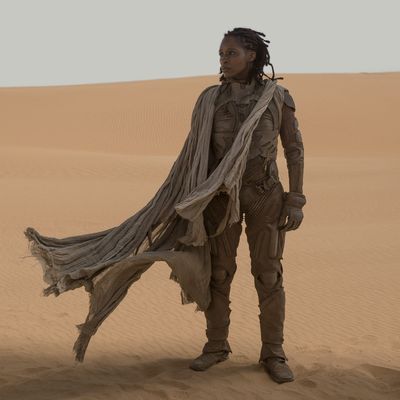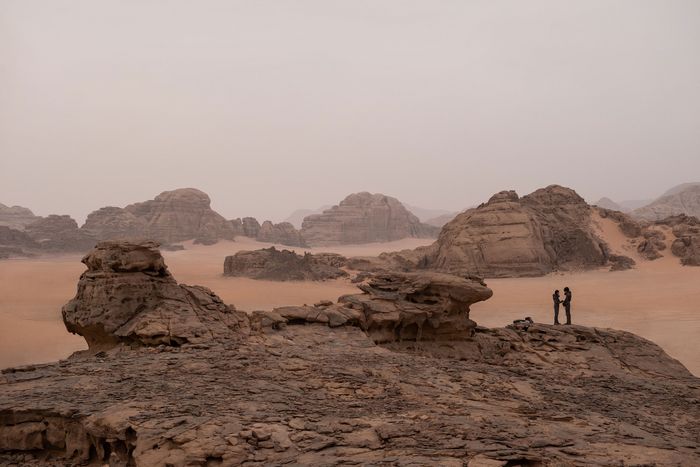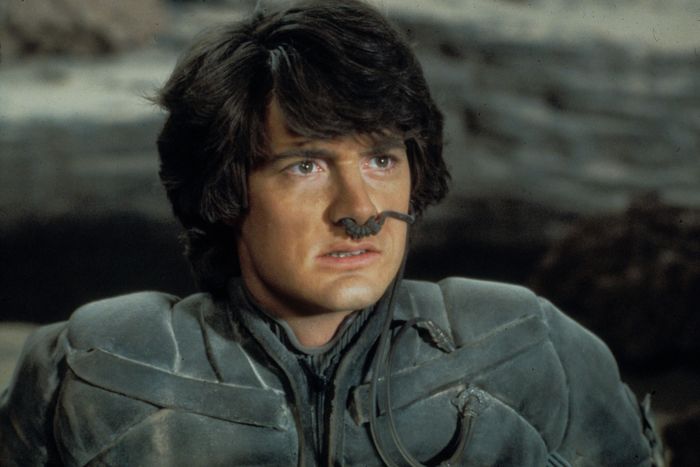
A child (usually a boy, sometimes a girl) comes of age in the desert. In their adolescence they seem different — special. Their lineage is royal and mysterious, and a formidable order with shadowy powers takes an interest in their future. Amid a harsh landscape of sun and sand, the child learns the ways of that place’s original inhabitants, and a fateful path unfurls. Indigenous knowledge becomes the outsider’s knowledge, and when that child grows up to become a leader (there is no version of this story in which they do not become a leader), it was the desert people’s expertise and customs that emboldened their ascendence.
Versions of this story abound. Luke Skywalker on Tatooine (and Rey Skywalker on Jakku) in the Star Wars film franchise. En Sabah Nur, who grows up in Egypt and renames himself Apocalypse, in the comics X-Men: The Rise of Apocalypse. Adrian Veidt, who travels through the Mediterranean and what used to be ancient Persia before calling himself Ozymandias, the Greek name of Pharaoh Ramesses II, in the graphic novel-turned-movie-turned-TV show Watchmen. And before them all, of course, was Dune’s Paul Atreides. In the honeyed, low-pitched tones of Oscar Isaac’s Duke Leto Atreides: That’s desert power.
The desert — in particular the region of the world long called the Middle East and North Africa (MENA), but increasingly referred to as West Asia and North Africa (WANA) — has long been a place onto which outsiders could map their own ambitions. (See: the Sykes–Picot Agreement.) In literature, especially the sci-fi kind, “issues of travel, migration, alterity, other cultures, colonization, empire” thrive in the arid expanses, argues Dr. Gerald Gaylard in his 2010 essay “Postcolonial Science Fiction: The Desert Planet.”
In journalist-turned-author Frank Herbert’s 1965 novel Dune, the first of six books that has since been adapted into two films and a TV miniseries, the desert is the planet Arrakis, the galaxy’s sole producer of spice, a natural resource that has hallucinogenic properties and also fuels space travel. Arrakis is subjugated by the galactic Padishah Empire, and by the royal houses that make up the Imperium (first the monstrous House Harkonnen, and later the more compassionate colonizer House Atreides). They mine the spice and mercilessly exploit the planet’s inhabitants, the Fremen. The heir of House Atreides, Paul, is the anointed outsider in this story, a possible messiah in the eyes of the Fremen. (In their Zensunni religion and in their language Chakobsa, derived from Arabic, he is “Mahdi” or “Lisan al Gaib.”) They take Paul in after House Atreides falls and prepare to wage a jihad.
Padishah, Sunni, Mahdi, Lisan al Gaib, jihad. All are terms that Herbert uses throughout Dune, and all are pulled from MENA languages and culture and Muslim ideology. Literary scholars who have analyzed Dune note them as essential components of Herbert’s narrative arc, yet movie and TV versions of Dune tend to diminish their importance, or leave them out entirely. In September 2020, the first trailer for Denis Villeneuve’s Dune: Part One was released, with a prominent focus on the term “crusade” rather than “jihad.” (Neither “jihad” nor “crusade” makes it into Dune: Part One; instead, Villeneuve and fellow screenwriters Jon Spaihts and Eric Roth settle on “holy war.”) Dr. Ali Karjoo-Ravary, assistant professor of Islamic Studies at Bucknell University, noted the language choice in an October 2020 Al Jazeera column. For Karjoo-Ravary, the absence of the word “jihad” obfuscates Herbert’s deliberate characterization of the Fremen, whose identity Karjoo-Ravary describes as “some future variety of Islam and Arab,” adding that “if it was real and people today saw it, they’d call it Islam.”
But Villeneuve and his collaborators do not call it Islam, nor Arab or any other MENA culture. Part One presents the Fremen as generic “people of color.” For all the inclusivity of its 2021 ensemble — which includes Jason Momoa, Dave Bautista, Oscar Isaac, Stephen McKinley Henderson, Chang Chen, and frequent Villeneuve collaborator and half-Iranian actor David Dastmalchian (under white makeup and a bald cap) as representatives of Houses Atreides and Harkonnen — not a single MENA actor was chosen to play Fremen. Instead, they are played by actors like Sharon Duncan-Brewster, Zendaya, Javier Bardem, and Babs Olusanmokun. (As Dune super fan John Hodgman recently said, “I’m very conflicted about Javier Bardem. I don’t know what accent he’s doing. What’s that supposed to be?”)
In subtle but significant ways, Part One denies the cultures that are so integral to its source material. House Atreides characters speak Mandarin and sign language, which are translated via subtitles; however, the Fremen language, some of which is taken directly from Arabic (like “Shai-Hulud”), gets no such treatment. The score, which mimics the ululation vocal sounds unique to Arabic and common throughout the MENA world, is described as “lamentation” in the film’s closed captions and as a “made-up language” by Hans Zimmer.
Speaking on his decision to turn away from Arab influences, Part One screenwriter Spaihts explains:
“The Arab world was much more exotic in the 1960s than it is today. Today the Arab world is with us, they’re our fellow Americans, they’re everywhere … If you were to build a kind of Arab future on Arrakis in a novel starting today, you would need to invent more and borrow less … What you can really see is that to Frank Herbert’s worldview, just dipping into Islam and dipping into the Arab world was sufficiently exotic to be science fiction. And now … you’d have to go farther afield to make science fiction.”
Is Herbert’s text Orientalist? Opinions on that vary among Dune scholars. For Karjoo-Ravary, who notes that Fremen are not the only characters to engage in a jihad in the novel, “Herbert is a product of his context [who] thought about cultures and religions in particular ways, but it is more complicated than other forms of Orientalism.” Gaylard gives Herbert even more credit, writing in his essay that Dune preemptively addresses the concerns of cultural critic Edward Said by complicating the “white savior” figure that some assume Paul to be — and that David Lynch’s 1984 film mistakenly presented Paul as.
“What is clear is that Herbert was far more comfortable with the overt Islamic and Arabic tones of his work than its mainstream reception over the decades,” Karjoo-Ravary adds.
Aside from Spaihts’s incorrect assumption that all of the Middle Easterners who inspired Herbert are Arab, his quote fails to capture how deep Herbert “dipped” into MENA culture, languages, and the Muslim religion (including Sunnism, Shi’ism, and Sufism). Dune is awash in details from his research. (As Herbert said in a 1984 interview, “My Arab friends wonder why it’s called science fiction. Dune, they say, is religious commentary.”) The term the Fremen use for Paul, “Mahdi,” directly refers to an eschatological figure in Islam. In fact, the Fremen language comprises more than 100 Arabic, Persian, and Turkish words and phrases, compiled and defined by Dune enthusiast Khalid Baheyeldin on his website The Baheyeldin Dynasty — an online resource that is itself challenged and expanded upon by Karin Christina Ryding, Georgetown University professor emerita of Arabic linguistics, in her 2021 publication “The Arabic of Dune: Language and Landscape.” (Baheyeldin and Ryding don’t sync up on every interpretation they offer regarding Herbert’s linguistic choices, but their agreement that “Arrakis” is not just a reference to “Iraq” is a reminder that nothing is superficial in Dune.)
Moreover, the book was released three years after the end of the Algerian War, during which Algerians survived brutal tactics from the French to wrestle back their country after more than 100 years of crushing colonial rule. According to Herbert’s son and biographer Brian, the Algerians — as well as “nomadic Bedouins of the Arabian plateau … separated from civilization by vast stretches of desert,” Turks, and Yemenese Arabs — inspired Herbert’s Fremen. “It feels real because it’s based on familiar events and landscapes in our world, but modified,” says Dr. Kara Kennedy (@DuneScholar), who has published extensively on topics related to Dune, including the connections between the fictional Paul and the real-life T.E. Lawrence, British Army officer and adviser to the Arabs during the Arab Revolt against the Ottoman Empire. “Having three-dimensional characters and multiple complexities helps elevate it to literature.” (Kennedy and Karjoo-Ravary had not yet seen Dune: Part One when they spoke to Vulture.)
Thus academics have long accepted that Herbert’s Arrakis represents a version of the Middle East after the post-World War I collapse of the Ottoman Empire, and the whims of oppressors like House Harkonnen embody the resource-churn of Western imperialism. The Fremen are MENA people who predominantly speak Arabic (“in a form my father believed would be likely to survive for centuries in a desert environment,” Brian clarifies in Dreamer of Dune) and practice a version of Islam. These details were not incidental, as Spaihts’s quote might lead one to believe.
Of course, scholars have been debating Dune and its adaptations for years. Lynch’s version was whitewashed from top to bottom, but at least its script included both “Zensunni” and “jihad” to tie the Fremen to the ethnic and religious foundations of Herbert’s books. So too did the three-part miniseries that aired on the Sci-Fi Channel in 2000. But in the April/May 1986 edition of Vector: The Critical Journal of the British Science Fiction Association, sci-fi author Hussain Rafi Mohamed wrote of the pitfalls of the David Lynch film, “The numerous references to and descriptions of the culture of the Fremen in the books is almost completely missing from the film. The rich multi-leveled atmosphere of the books is attempted in filmic terms not so much through labyrinthine plotting as through surface texture, sets and costumes and so forth.”
Thirty-five years later, Villeneuve’s Part One makes many of the same flattening choices. For example, oil becomes a central surface texture. If it weren’t already apparent that spice is a stand-in for the real-world resource, Villeneuve gives us an image of the Baron of House Harkonnen (Stellan Skarsgård), the former steward of Arrakis, submerged lasciviously in a vat of bubbling petroleum while planning an overthrow of House Atreides and the mass genocide of the Fremen. On Arrakis, Villeneuve’s wide angles and experimental exposure cast the desert planet as exotic and alien, but it’s Zimmer’s score — with all those trilling women’s voices and MENA folk rhythms — that hammers the notion over viewers’ heads.
The booming music does nothing to conceal the embarrassing pronunciations of Arabic and Persian words, but it certainly emphasizes the action scenes that revolve around the Fremen’s guerrilla-warfare tactics: They hide underneath the sand waiting for foes and then burst out to attack them; they disappear into the landscape by walking in one another’s shuffling footsteps; they can ride the gigantic sandworms that so terrorize the Imperium’s spice-harvesting machinery. These moments are admittedly stunning, and energize a film that spends a fair amount of time on palace intrigue. But the Fremen, per Herbert, were more than just noble-savage stereotypes. They are deeply faithful — almost superstitious — yet pragmatic. After they take in Paul and his mother Jessica, we learn that the Fremen have secretly developed geological means to transform their desert planet into a verdant oasis. They agree to train the mother and son in Fremen ways, but the Muslim ideology and ritual present in Herbert’s vision of their culture is never explicitly depicted.
We do get glimpses of these fictional Fremen ways, though. They have little regard for physical bodies after death, and therefore make a habit of breaking down corpses for moisture. They spit as an expression of respect. They sit down together for coffee service. But there is a veneer of cultural non-specificity exacerbated by the film’s lack of MENA actors. “Having a generic ‘indigenous oppressed peoples,’ even set in the desert, doesn’t give the same layers, undertones, and thematic messages and warnings around religious influences and charismatic leaders, that the Middle Eastern history, culture, and influence give,” Kennedy explains. “It is a safer story of good versus bad guys, oppressors versus oppressed, but sheds the layers of significance around religion and the West versus East message of the original.”
A person might argue that had Villeneuve’s Dune cast MENA actors as Fremen, another problem would present itself: We’d be reminded of how often Hollywood positions actors of the region to play religious warriors — terrorists. (Film roles for MENA actors are scant regardless. According to the UCLA Hollywood Diversity Report for 2021, MENA people represent 1.1 percent of film leads and 1.3 percent of all film roles in 2020. A June 2021 USC Annenberg Inclusion Initiative study was similarly dire. The study, which analyzed 8,965 speaking characters in the 200 top-grossing films released between 2017 and 2019 from the United States, the U.K., Australia, and New Zealand, found that 1.6 percent were Muslim.)
But when Brian Herbert announced Villeneuve as the new cinematic guardian of Dune in 2017, there was reason to be hopeful. Villeneuve directed 2010’s Incendies, a gripping film about a civil war in an unnamed Middle Eastern country, and he cast the formidable Palestinian actress Hiam Abbass as a replicant resistance leader in Blade Runner 2049. In an interview with IndieWire about Incendies, which was an adaptation of Wajdi Mouawad’s same-named play, Villeneuve said, “I don’t know anything about war [and] I didn’t know a lot about Arabic people. So in order for me to adapt the screenplay, I had to be a listener … Half the movie I re-wrote while talking to actors there. And the challenge for me was to be faithful to Arabic culture, but I think we succeeded.”
Few journalists have asked Villeneuve about the lack of MENA representation in Dune, and those who have did not probe his answers. In an interview with The Nerds of Color, this was Villeneuve’s answer to the question, “Could you talk about the casting of the Fremen and the meaning behind them in your film?”:
“The thing is I tried to be as faithful as possible to Frank Herbert’s description … And this idea that the world of the Fremen would be kind of inspired by culture from North Africa and the Middle East — culture that I deeply love by the way, because it’s a very complex world — There was this idea that there was something powerful that will come out from Africa in Frank Herbert’s mind. And I tried to respect his ideas. Which is why I did the casting the way I did. And I feel truly that I’m right in doing it this way. It feels authentic, it feels honest, and true to the book.”
This latest version of Dune brings to mind what happened with David Lean’s Lawrence of Arabia. In adapting Lawrence’s story and putting on film the events that guided Lawrence’s book Seven Pillars of Wisdom — which Herbert referenced often while researching Dune — Lean assembled a cast of actors who did not summarily represent the Arab world. White Brit Alec Guinness played royal Prince Faisal, who would be king of both Syria and Iraq. Mexican-American Anthony Quinn played Bedouin Arab Sheikh Auda Abu Tayi. But at least Lawrence of Arabia had Omar Sharif, who was ethnically Lebanese and Syrian and nationally Egyptian, in its main cast. Sharif’s work as Sherif Ali ibn el Kharish earned him a Best Supporting Actor Academy Award nomination and helped jettison Sharif into Hollywood as a major star. Dune: Part One arrives in theaters 59 years after Lawrence of Arabia, but offers no similar opportunity for a MENA actor or actress.
Looking for any kind of identity-related representation in an entertainment product is always a fraught proposition, and as Karjoo-Ravary notes, “Herbert wasn’t a Muslim, and this isn’t a Muslim story. It is Herbert’s story, reflecting his time.” But decades after Herbert’s time, his meticulously researched and vividly imagined depictions of MENA people and their prevailing religion failed to make it to the screen. “To say that the description of the Fremen and their culture is masterly is demonstrably true,” Mohamed wrote in Vector. “I know something of my own cultural background and on reading Dune I instantly felt that here was a true picture, whether derived from firsthand experience or not. I cannot remember anywhere else in [science fiction] reading about an Arabic/Muslim-like culture that had quite the same sense of people and place.” Dune has always been about more than just the desert, but Villeneuve’s Part One can’t see past the sand.
More From This Series
- Dune: Prophecy Recap: The Sisterhood Is Doing It for Themselves
- Dune: Prophecy Recap: Ancient History
- Dune: Prophecy Recap: A Harkonnen Never Forgets




